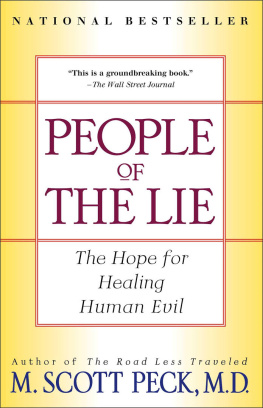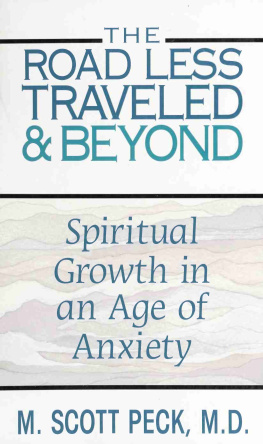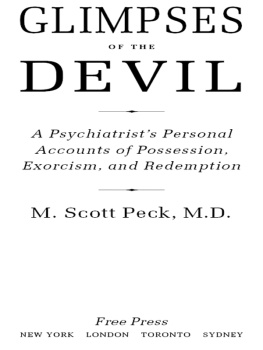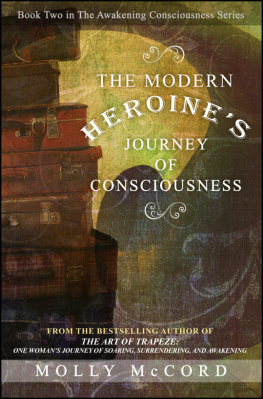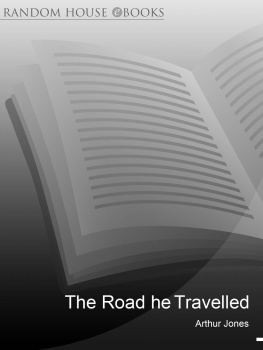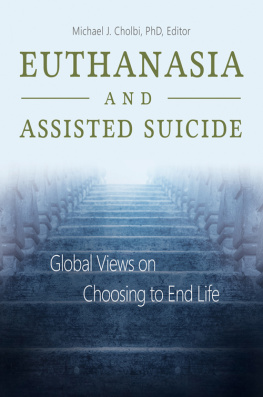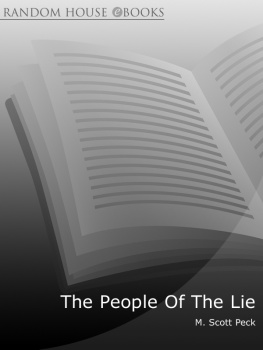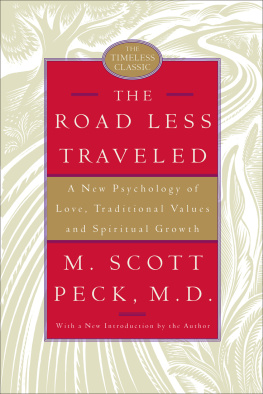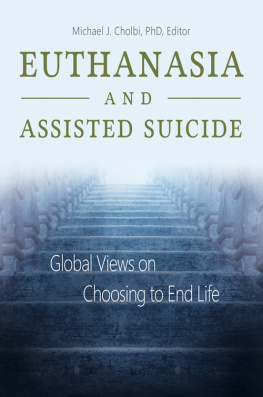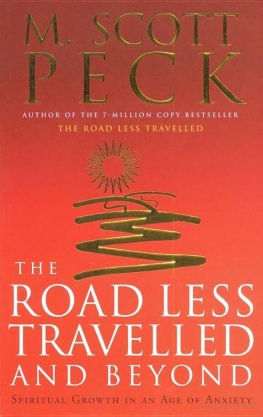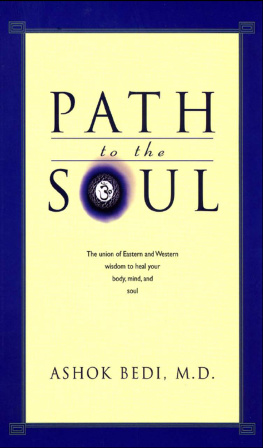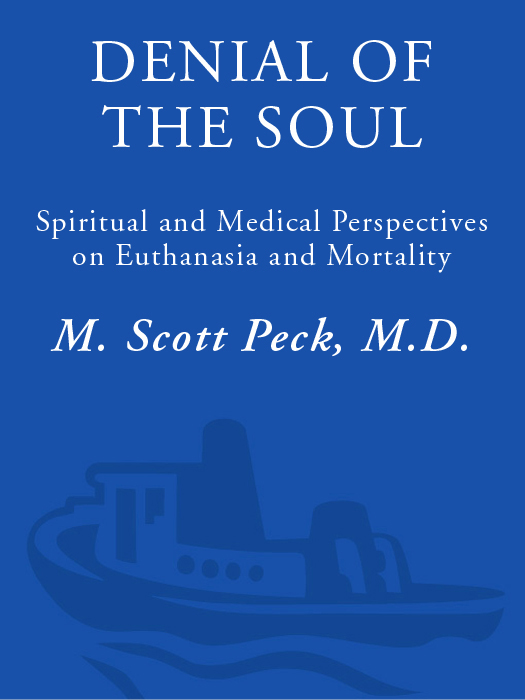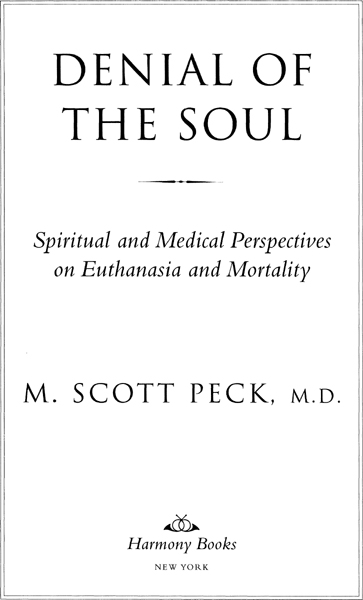ALSO BY M. SCOTT PECK, M.D.
The Road Less Traveled
People of the Lie
What Return Can I Make? (with Marilyn von Waldner and Patricia Kay) (reissued as Gifts for the Journey, with Marilyn von Waldner)
The Different Drum
A Bed by the Window
The Friendly Snowflake (illustrated by Christopher Peck)
A World Waiting to Be Born
Meditations from the Road
Further Along the Road Less Traveled
In Search of Stones (illustrated by Christopher Peck)
In Heaven as on Earth
The Road Less Traveled and Beyond
To
the ministry
of the
employees and volunteers
of Hospice
ACKNOWLEDGMENTS
This book could not have come into being without the assistance of a large number of people. I regret I cannot thank them all, but some deserve special mention.
First, my basic support system that continues to keep me going: our office manager, Susan Poitras, who typed the books drafts; our program director, Gail Puterbaugh, who organizes our lives; our assistant, Valerie Duffy, who picks up after us; and my beloved wife, Lily, who is their general manager and mine.
Next, the publishing professionals who have made the book a public reality: Jonathan Dolger, my long-term agent and champion; Leslie Meredith, simultaneously the books acquisition editor, broad-brush editor, and line editor; and her talented assistant editor, Andrew Stuart.
More than any of my other books, this one has required the assistance of medical colleagues. I wish to thank Lucy Waletzky, M.D., whose early concern with its central issue helped inspire me to address the subject and who continued to encourage me after reading its first draft; Morris Clark, M.D., our generous and wise family physician for over two decades, who offered me his perspectives from internal medicine; and John Battista, M.D., who brought me up to date on some of the psychiatric aspects.
Andrew Solomon not only courageously provided me with the most central of all the cases in this book but also took the time to vulnerably and personally discuss with me those essential details that were initially unclear.
I would also like to take this opportunity to thank belatedly in print a person who has lurked behind the scenes of every book I have ever written: Sister Ellen Stephen, O.S.H. A nun, teacher, community leader, and anthologized poet, E.S. has been my primary spiritual director for the past twenty years. To her consistent friendship and sometimes gentle, sometimes confrontational guidance, I owe a large portion of whatever wisdom and sanity I possess.
All of the above are responsible for making this a better book than it would otherwise have been. They are not responsible, however, for any of its deficiencies. That responsibility is entirely my own.
Finally, I would like to express my particular gratitude to someone already mentioned: Gail Puterbaugh. Beyond the responsibilities of her employment and family, she has served for many years as a dedicated hospice volunteer. From the word go, she was a source not only of information but of boundless enthusiasm for this work at every stage of its evolution. She is an exemplary representative of those to whom this book is dedicated. Thank you.
While it is not necessarily our lot in this age that we should suffer physically to the end of our endurance, it is still our lot that we should so suffer emotionally. The denial of this fact of life is the central defect of the age.
CONTENTS
PART I
Chapter 1
Chapter 2
Chapter 3
Chapter 4
PART II
Chapter 5
Chapter 6
Chapter 7
Chapter 8
PART III
Chapter 9
Chapter 10
INTRODUCTION
T his is an age where every possible issue seems to be coming out of the closet, which, I suspect, is generally to the good. One such issue is the topic of euthanasia. I have no desire to see it thrust back into the closet. I believe it a proper matter for public debate. Currently, however, the debate strikes me as strangely skewed, incomplete, and, in some quarters, passionless. This book is an attempt to rectify the situationnot to dampen the debate but to enlarge it and heat it up.
My motivation for the attempt is a sense of alarm that the subject of euthanasia is not being given the importance it deserves, almost as if it is being lost among the myriad of other issues that have come out of the closet or been on the table for some time. The issue of euthanasia may be more critical than all the others. Indeed, it is possible we may need to reach a national consensus about it before all the other issues can be more satisfactorily resolved.
Of course weve always known about the existence of euthanasia. Just because it was in the closet doesnt mean that we had no awareness of it, only that we didnt want to bring it into the living room for serious discussion.
In 1950, when I was fourteen, I began to think seriously about death. It occurred to me that perhaps the most important thing about my existence was that it was limited. Along with everybody else, I was going to die. Thinking for myself as well as others, it seemed to me that if someone was clearly dying there was no reason for that person not to hasten the process, if she or he so desired, to avoid the unpleasantness involved. I knew perfectly well what the word euthanasia meant, and I believed in it. I was very rational back in those days.
A generation later, in 1975, a very prominent American theologian, Dr. Henry Van Dusen, and his wife executed a suicide pact together in their New York City apartment, leaving behind them a most rational and public letter explaining that they were motivated by their desire to avoid the inconveniences of old age and natural death. I found myself mildly shocked. Had a more ordinary elderly couple made a suicide pact for the same reasons I wouldnt have been in the least surprised. But because Dr. Van Dusen had been a famous religious leader I was disquieted. Somehow it seemed that religion or spirituality was an aspect of the euthanasia issue, although I had no idea at the time of the nature of that aspect.
Since then, however, I have had enough life experience, including professional experience in medicine, psychiatry, and theology, to believe I can sufficiently understand the complexities of euthanasia so as to be able to make a clarifying contribution to its debate.
The current debate over euthanasia is often simplistic. That is hardly surprising, since the process of debate is usually construed as a win-or-lose activity in which one party will eventually be declared right and the other wrong. It is also not surprising, since even the well educated tend to think simplistically about all manner of issues ranging from abortion and homosexuality to war and the right diet. But we do not live in a black-and-white world, and for some years I have been engaged in a crusade against simplistic, one-dimensional thinking.
The subject of euthanasia is complex. We dont even have a generally agreed-upon definition of the word. Is euthanasia solely an act committed by someonea physician or family memberon someone else who is ill or dying? Or can the term also be used for someone who is ill or dying who kills himself without the assistance of another? Does euthanasia require the patients consent? The familys consent? Is it separable from other forms of suicide and homicide? How does it differ from simply pulling the plug? If one type of euthanasia consists of refraining from the use of heroic measures to prolong life, how does one distinguish between those measures that are heroic and those that are standard treatment? What is the relationship between euthanasia and pain? Is there a distinction to be made between physical pain and emotional pain? How does one assess degrees of suffering? Above all, why are ethical issues involved, and what might they be?


